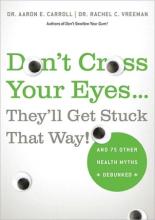Don't Cross Your Eyes... The Review
 |
“Poison!” my Russian grandmother used to spit, pointing at the white part of a French loaf. “It vill make you sick! Eat only crust.” Sadly for me, The inside of a baguette is poisonous is not among the 75 health myths debunked in the lively Don’t Cross Your Eyes. (Perhaps there’ll be a special Eastern European Jews edition.) But the book does get you thinking about the origin and purpose of myths about health—even as the authors take up the tools of hard science and humor to dissect them.
Does green snot mean that you need an antibiotic? Will cheese make you constipated? Should you stretch before exercising? Spoiler alert: No, no and no. Carroll and Vreeman turn to the strongest studies and latest research to support their conclusions, mopping up false puddles with their sponge of knowledge. If, over the course of your lifetime, you’ve fretted over various imaginary ailments or fantasized about various imaginary cures, then the book makes for a nostalgic, alphabetically organized trip down hypochondria lane. (My own medicine cabinet, complete with glycerin suppositories and slippery elm lozenges, is itself like some sort of Museum of Discomfort and Hope.) Plus, along the way, you get to learn a fair amount about research: I now know the difference between a case-control study, a prospective cohort study and, our hero, the randomized, double-blind, placebo-controlled study. I also know now what “bioavailable” means (and no, it’s not that your cute lab partner is single).
But the book is perhaps even more interesting as a sociological study of health myths than as a medical one. Can you get an STD from a toilet? Not likely, the authors suggest—although that myth sure provides a handy way to explain some sudden-onset gonorrhea to your wife. A neti pot might accomplish nothing more than the conveying of saltwater unhelpfully into your nasal cavity—but at least using one offers you a sense of agency, something to do, even if it’s just admiring a sinkful of your own diluted snot. And, of course, there’s the delightful controlling of other people, which health myths offer up in abundance: Do! Don’t! Wait 15 minutes first! This is, of course, the special provenance of parents. Sitting too close to the TV will ruin your eyes!, we say—maybe because we just can’t bear the sight of those tender faces pressed so close to the televised reality of Wife Swap.
There’s also the actual debunking, which can be both interesting and useful. I came to the book believing that steam helps croup (it doesn’t), that you can prevent food allergies by waiting until babies are older before feeding them solids (you can’t) and that hydrogen peroxide is good for disinfecting wounds (it’s not). Carroll and Vreeman have a bright sense of irony that illuminates their overall forest-vs.-trees approach: for example, their anecdote about a woman who uses a paper towel to open a bathroom door—putatively to avoid illness—and then pops outside to light up a cigarette. Likewise, for anyone fretting more about whether they accidentally touched a toilet than whether they get enough exercise, the authors suggest a reordering of health priorities, which is good advice. But does anybody really think that you’ll go blind from masturbating or get warts from touching a toad? These are among the myths Carroll and Vreeman take on, and the book can feel slightly contrived. To be fair, they may have used up the more obvious swimming-after-eating myths in their first book, Don’t Swallow Your Gum, but with its occasional lapses into condescension and its odd absence of contractions, I wondered at some point whether the book might actually be aimed at a younger audience.
It’s not—as the many, many references to sex make clear. In fact, the only thing that appears in the index more often than sex is misguided cold remedies; they really could have called the book Sex and Colds—and I don’t mean that in a bad way. Not much is going to help your cold, it turns out, but sex is good, and you should have as much of it as you (safely) can. Even before the big game and even if the oysters you ate beforehand won’t actually boost your libido.
Given the current dreariness of things, this merriment about sex is delightful. And it extends to life in general. You cannot control the world, the authors suggest in 75 different ways, so you might as well relax and try to enjoy it. Sure, if you shake people’s hands, you might get a cold—but you probably won’t if you wash your own afterwards, and hand-shaking is an important part of human culture and connection. This is, of course, a more holistic idea of health than germ theory: it’s a whole world view. Aaron Carroll was a chem major at Amherst, but the book minors in philosophy: Worry less; enjoy more. Eat whatever part of the loaf you like.
Reviewed by Catherine Newman ’90
Catherine Newman wrote the memoir Waiting for Birdy and blogs at benandbirdy.blogspot.com.